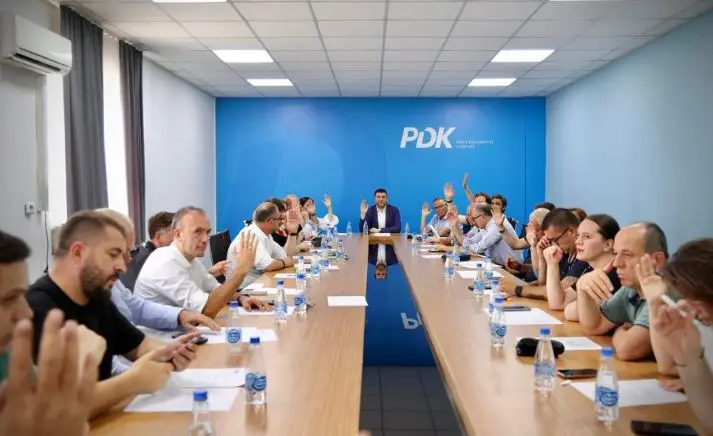The Democratic Party of Kosovo (PDK) has formally responded to MP Enver Hoxhaj, who earlier today requested that the party postpone its upcoming Extraordinary Convention for electing a new party leader. Senior party officials emphasized that, according to the PDK Statute, the convention must be held within five days of the party leader’s resignation.
The clarification was delivered by the Secretary-General of PDK, Vlora Çitaku, who confirmed that the Extraordinary Convention was convened in full compliance with Article 35 of the Party Statute, following the resignation of former chairman Memli Krasniqi.
PDK: Statute Is Clear — Convention Must Be Held Within Five Days
Speaking to Nacionale, Çitaku underlined that the timeline is not a matter of preference but a statutory obligation.
“According to the Statute, the convention must be held within five days. We encourage and welcome an internal contest. Any member who meets the requirements set by the Statute is welcome to run,” she said, adding that multiple candidates would make the convention “even more meaningful.”
Çitaku stressed that while internal democracy matters, the party’s ultimate priority is the victory of PDK in the upcoming parliamentary elections.
“What is essential is that we emerge unified, with a clear vision and a strong platform,” she noted.
“More important than the internal race is our victory in the national elections, and the question of who will be the next Prime Minister of the Republic of Kosovo.”
Hoxhaj Calls for Postponement, Warns Against ‘Rushed and Orchestrated Process’
Earlier today, PDK MP Enver Hoxhaj publicly called for the convention — scheduled for Monday — to be delayed at least until the following Sunday, arguing that “a serious party cannot hold a political and substantive convention in such a short time.”
In a detailed statement posted on Facebook, Hoxhaj said the rapid timetable does not allow sufficient space for members and delegates to familiarize themselves with potential candidates and their platforms.
“This haste does not guarantee a quality race, nor the reform and unity required for PDK at this moment,” he warned.
While Hoxhaj did not confirm whether he plans to run for party leader himself, he emphasized the need for more than one candidate to ensure genuine competition.
He also hinted at internal pressures, saying that the leader’s resignation — coupled with preferences for a successor — creates the perception of “pre-arranged schemes that do not push the party forward.”
“I am clearly against any imposition, any attempt to steer the race, and any formula that ignores the base and the delegates,” Hoxhaj stated.
“PDK needs new leadership, not old schemes; a new vision, not a simple rotation of roles.”
Uncertain Path Ahead as Internal Tensions Surface
The exchange between Çitaku and Hoxhaj has highlighted emerging internal tensions within PDK as it prepares for a leadership race at a decisive political moment. While leadership transitions are not unusual, the compressed timeline and differing interpretations of how the process should unfold signal a potentially contentious internal contest.
Whether additional candidates will step forward — and whether the convention will remain on the current schedule — remains to be seen.







